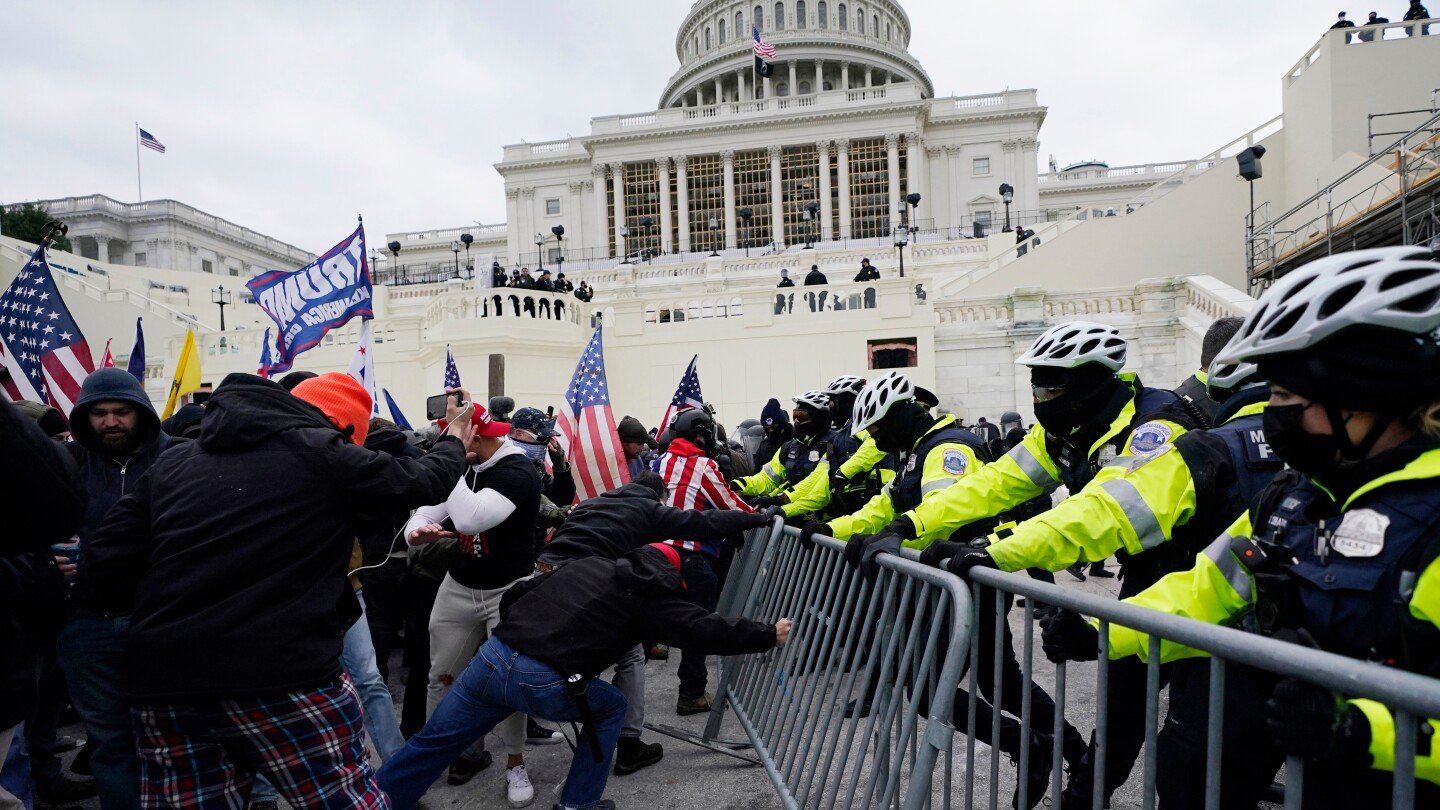President
Trump pardons Jan. 6 rioter for gun offense and woman convicted of threatening to shoot FBI agents

WASHINGTON (AP) — President Donald Trump has issued two pardons related to the investigation into the Jan. 6, 2021 riot, including for a woman convicted of threatening to shoot FBI agents who were investigating a tip that she may have been at the Capitol, officials said Saturday.
In a separate case, Trump issued a second pardon for a Jan. 6 defendant who had remained behind bars despite the sweeping grant of clemency for Capitol rioters because of a separate conviction for illegally possessing firearms.
It’s the latest example of Trump’s willingness to use his constitutional authority to help supporters who were scrutinized as part of the Biden administration’s massive Jan. 6 investigation that led to charges against more than 1,500 defendants.
Suzanne Ellen Kaye was released last year after serving an 18-month sentence in her threats case. After FBI contacted her in 2021 about a tip indicating she may have been at the Capitol on Jan. 6, she posted a video on social media citing her Second Amendment right to carry a gun and she threatened to shoot agents if they came to her house. In court papers, prosecutors said her words “were part of the ubiquity of violent political rhetoric that causes serious harm to our communities.”
An email seeking comment was sent to a lawyer for Kaye on Saturday. Kaye testified at trial that she didn’t own any guns and didn’t intend to threaten the FBI, according to court papers. She told authorities she was not at the Capitol on Jan. 6 and wasn’t charged with any Capitol riot-related crimes.
A White House official said Kaye suffers from “stress-induced seizures,” and experienced one when the jury read its verdict. The White House said this is “clearly a case of disfavored First Amendment political speech being prosecuted and an excessive sentence.” The official requested anonymity because they weren’t authorized to publicly discuss the case.
In a separate case, Trump pardoned Daniel Edwin Wilson of Louisville, Kentucky, who was under investigation for his role in the riot when authorities found six guns and roughly 4,800 rounds of ammunition in his home. Because of prior felony convictions, it was illegal for him to possess firearms.
Wilson’s case became part of a legal debate over whether Trump’s sweeping pardons for Jan. 6 rioters in January applied to other crimes discovered during the sprawling federal dragnet that began after the attack on the Capitol. The Trump-appointed federal judge who oversaw Wilson’s case criticized the Justice Department earlier this year for arguing that the president’s Jan. 6 pardons applied to Wilson’s gun offense.
Wilson, who had been scheduled to remain in prison until 2028, was released Friday evening following the pardon, his lawyer said on Saturday.
“We are grateful that President Trump has recognized the injustice in my client’s case and granted him this pardon,” attorney George Pallas said in an email. “Mr. Wilson can now reunite with his family and begin rebuilding his life.”
The White House official Saturday that “because the search of Mr. Wilson’s home was due to the events of January 6, and they should have never been there in the first place, President Trump is pardoning Mr. Wilson for the firearm issues.”
Wilson had been sentenced in 2024 to five years in prison after pleading guilty to conspiring to impede or injure police officers and illegally possessing firearms at his home.
Prosecutors had accused him of planning for the Jan. 6 riot for weeks and coming to Washington with the goal of stopping the peaceful transfer of power. Authorities said he communicated with members of the far-right Oath Keepers extremist group and adherents of the antigovernment Three Percenters movement as he marched to the Capitol.
Prosecutors cited messages they argued showed that Wilson’s “plans were for a broader American civil war.” In one message on Nov. 9, 2020, he wrote: “I’m willing to do whatever. Done made up my mind. I understand the tip of the spear will not be easy. I’m willing to sacrifice myself if necessary. Whether it means prison or death.”
Wilson said at his sentencing that he regretted entering the Capitol that day but “got involved with good intentions.”
The Justice Department had initially argued in February that Trump’s pardons of the Jan. 6 rioters on his first day back in the White House didn’t extend to Wilson’s gun crime. The department later changed its position, saying it had received “further clarity on the intent of the Presidential Pardon.”
U.S. District Judge Dabney Friedrich, who was nominated to the bench by Trump, criticized the department’s evolving position and said it was “extraordinary” that prosecutors were seeking to argue that Trump’s Jan. 6 pardons extended to illegal “contraband” found by investigators during searches related to the Jan. 6 cases.
Politico first reported Wilson’s pardon on Saturday. ___ Megerian reported from West Palm Beach, Fla.
